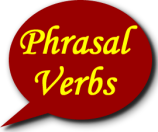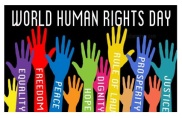As I could not find any other way of warning you about the room, I’m using the blog.
You’ll be doing your test in your usual classroom (A207).
Can you spread the word among you? I’d be grateful.
See you tomorrow.
Ana Maria Coelho
As I could not find any other way of warning you about the room, I’m using the blog.
You’ll be doing your test in your usual classroom (A207).
Can you spread the word among you? I’d be grateful.
See you tomorrow.
Ana Maria Coelho
Posted in Uncategorized | Leave a Comment »

Phrasal verbs are quite common in everyday life as they are used in informal language.
They are composed of mainly two parts:
a base verb and one particle (in some cases two).
With a common verb like go or get there are many combinations. Look at the examples:
Some of the particles are separable some are not.
There are many varieties, but we may organize them by using their common verb or their common particle.
Would you like to review the presentation we used in the class?
Click here: Multi-word_verbs_presentation1
Would you like a list? Click here.
A few more exercises?
Posted in Uncategorized | Leave a Comment »
 Relative clauses
Relative clausesRelative clauses are an ingenious way of connecting sentences so as to give more cohesion to a paragraph or a text.
Some of these clauses provide essential information and are called defining clauses, while others simply give the reader additional, but non-essential information about the subject. In that case they are non-defining.
The most common relative pronouns are the following:
How do you use them? Look at the table below.
To review the presentation we used in the class, click here: Relative Clauses_12º_2015
For further information use the following link: http://wp.me/p2im1O-87
Posted in Relative clauses, Uncategorized | Leave a Comment »
Reporting what other people said is a common situation both in the media and in our daily lives.
In both situations one should be as accurate as possible so as to convey the message intended by the speaker.
For that one can quote the speaker using his exact words, report his exact words or convey his general message.
In this case the interviewee’s question could be reported in two ways:
He asked if she would like to go out with him.
or
He invited her to go out with him.

The reporting verb makes all the difference, because the second one conveys not only the message, but also the intention of the speaker.
Look at the following examples:
 – I’m sorry about the delay. I won’t do it again.
– I’m sorry about the delay. I won’t do it again.
He apologised for his delay and promised not to do it again.
However, to do that one has to be aware of the different patterns of reporting verbs. There are three main ones.
Click on this link to check a full list of reporting verbs grouped according to their pattern – Reporting verbs list.
Watch this short vídeo:
Now try to report the following situations. Use some specific verbs from the list below.
threaten announced exclaimed commented thought denied refused wondered
Try a few more exercises:
To review the presentation we used in the class: Reported Speech-12º
Posted in Uncategorized | Tagged Reported Speech, Reporting verbs | Leave a Comment »



As for the drawbacks, they are quite numerous as well:

Certainly you can think of a few more to add to each side of the debate. So now it’s up to you to decide if drawbacks outweigh the benefits or the other way round.
Watch this film for quick review:
To review the presentation we used in the class: Globalisation
Posted in Globalisation, Uncategorized | Tagged Global village, Globalisation | Leave a Comment »
As the title says we have an inversion when the normal subject-verb order is reversed and the verb comes before the subject of that sentence.
Should you decide to come earlier, call me.
Were I you, I would do the same.
Had I been in the same circumstances, I would have racted in the same way.
Never had I witnessed such an outrageous disrespect!
Hardly could I believe my eyes!
Under no circumstances would he accept those conditions.
Little did he know about the truth.
Scarcely had I begun to speak when I was interrupted.
No sooner had he left his home than the burglars broke in.
Not only did they take all the money they could find, but they also smashed the furniture.
Still some doubts?
Try this page and its exercises:
Posted in Inversion of Subject and Verb, Negative adverbials, Uncategorized | Tagged Inversion, Negative adverbial | Leave a Comment »
Extensive Reading
Born Marguerite Ann Johnson on April 4, 1928, Maya was an American author and poet who has been called “America’s most visible black female autobiographer”. She is best known for her series of six autobiographical volumes, which focus on her childhood and early adult experiences. The first and most highly acclaimed, I Know Why the Caged Bird Sings (1969), brought her international recognition, and was nominated for a National Book Award. She has been awarded over 30 honorary degrees and was nominated for a Pulitzer Prize for her 1971 volume of poetry, Just Give Me a Cool Drink of Water ‘Fore I Diiie.
Find some more poems here:
Watch this video that will give you a quick view of her life and career.
- How many ‘defeats’ did she have to face in her life?
- How did she manage to overcome them?
- How many different occupations did she have?
- How successful was she?
One of her many stories about her childhood, this one focus on the period she lived with her maternal grandmother in Stamps, Arkansas, a typical Southern town in the late 1930s where Negros were tolerated as a source of cheap labour meant to make white domination last as long as possible.
Watching the film “Twelve Years a Slave” might be a good introduction to study of Maya’s story.
How vital was slavery for Southern states’ economy?
How many different forms can racism take?
How important is/was someone’s name?
1619 – First blacks land in America
1763 -1837 – American War Independence.
1860 / 65 – ______________________.
1863 – Emancipation Proclamation is signed by _____________________.
1865 – 13th Amendment abolishes slavery in all US territory.
1868 – 14th Amendment granted blacks citizenship.
1866 – ____________________ (group/organisation) was created to defend white supremacy.
1870 – 15th Amendment guaranteed their right to vote.
Jim Crow laws passed in the Southern states segregating blacks and whites in most public places.
1939 / 45 – World War II – Black Americans are incorporated.
1954 – the United States Supreme Court outlawed segregation in the nation’s school systems
1955 – Rosa Park’s refusal to give up her seat to a white on a segregated bus
1955 / 63 – Civil Rights Movement
1963 – March on Washington
1964 – Civil Rights Act signed.
1965 – ____________________ assassinated.
1968 – Martin Luther King is assassinated
Reorder the following episodes according to the structure of the story “NAMES”.
Which adjectives describe these three characters psychologically?
sensitive tolerant loyal ingenuous unhappy lively
selfish critical vindictive meticulous friendly perceptive sympathetic snobbish heartless frustrated influenceable submissive tolerant lonely

What is the main theme of the story?
What signs or evidence can you find in the story of that?
What kind of language is used in the short story?
Only one type?
Is there any class division visible in the language?
Posted in Maya Angelou, Names, Short story, Uncategorized | Tagged Maya Angelou, Names | Leave a Comment »
Conditional tenses are used to speculate about events that may still happen or that have already taken place.
To convey that idea of condition these clauses may include one of these connectors:
if
whether
unless
provided / providing
as long as
in case
Besides these four types, we can also create mix types 2 and 3. they are called mixed types. Look at the following examples:
If I had studied harder, I would have a better job now. = past condition with a present result
If we knew about your coming, we would have picked you at the station. = imaginary condition with an impossible past result
Exercises on conditional clauses
In more formal situations you may omit if and use the following structures:
should + subject + verb – for probable situations in the present or future
Should you wish to cancel your reservation, please contact our customer service department.
= if you wish to cancel…
were + subject + to + verb – for improbable conditions (present or future)
Were the PM to cancel his visit , he would send a message. = If the PM were to cancel…
had + subject + past participle – for impossible conditions (past)
Had he known about the riots, hae wouln’t have come. = If he had known about….
Revise what we said in class with the eletronic presentation and then use the links below for more practice:
Posted in Conditionals, Omitting if, Uncategorized | Tagged conditional clauses, If clauses, Omitting if | Leave a Comment »

Passive is used whenever the action is more important than its author.
The impersonal passive is used whenever the speaker wants to make clear that the statement was made by someone else.
In that case the statement is introduced by expressions such as the following:
Examples:
Although possible, their passive form is more commonly used.
it + passive verb ( be+ past participle)+ that clause
Examples:
An alternative form is using the subject of the second clause as the main subject.
the subject of the main sentence + passive verb + to-infinitive.
Examples:
If what is being reported is in the present or future, one should use a simple infinitive (to infinitive)
If the event is in the past , one should use a perfect infinitive (have + past participle).
Below you can find the PPT we used in class and some more exercises:
Posted in Impersonal Passive, Passive Voice | Leave a Comment »

Although the word rights is often used to defend points of view or comment on events, most people don’t know exactly what rights are those, nor are they aware of the long history behind them.
Watch the following video to learn or recall what you know about them:
Can you recall what you heard and complete this grid with the main stages of the Human Rights history?
Why are these dates important?
Maybe this picture can help you.
Human rights can be defined as basic rights and freedoms that all people are entitled to regardless of nationality, sex, national or ethnic origin, race, religion, language, or other status.
The Universal Declaration of Human Rights (UDHR) is the basis of the international system of protection for human rights. It was adopted by the United Nations General Assembly on December 10th, 1948 ans so this day is celebrated annually as International Human Rights Day.
The 30 articles of the UDHR establish the civil, political, economic, social, and cultural rights of all people, some of which you can see here.
To help you go through some of the Articles, view the following clip.
Posted in Human Rights, Uncategorized | Leave a Comment »